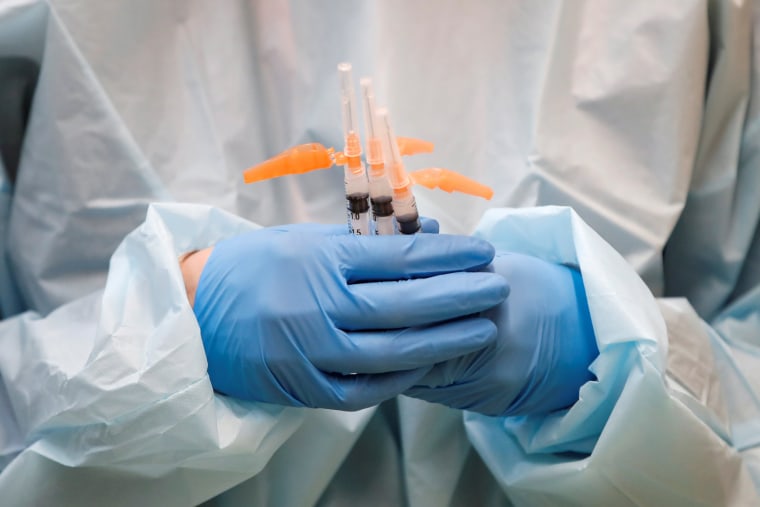Moderna said Monday that its Covid-19 booster does appear to provide protection against the omicron variant that is currently surging across the world.
Preliminary data from lab testing found that the version of its booster currently in use in the United States and elsewhere provided increased antibody levels to neutralize the virus, Moderna said. But it also found that a double dose of the booster shot provided a much greater increase in those levels.
The news is the latest sign that booster shots are an effective way to protect against the new variant, which has driven a rapid increase in case numbers since first emerging last month.
The drug company said its currently FDA-authorized 50 microgram booster was found to increase neutralizing antibody levels against omicron 37-fold compared to pre-boost levels. Meanwhile, it found that a 100-microgram booster dose gave an 83-fold increase in neutralizing antibody levels.
The company said it would still be working to develop an omicron-specific booster, however, with the shot expected to advance into clinical trials in early 2022.
Download the NBC News app for full coverage of the Covid-19 pandemic
In a statement, Moderna CEO Stéphane Bancel said the company's findings should come as "reassuring" news.
“The dramatic increase in Covid-19 cases from the omicron variant is concerning to all. However, these data ... are reassuring,” Bancel said.
Still, he said, “To respond to this highly transmissible variant, Moderna will continue to rapidly advance an omicron-specific booster candidate into clinical testing in case it becomes necessary in the future."

Moderna said the decision to focus on the current vaccine, mRNA-1273, was driven in part by how quickly the recently discovered variant is spreading.
“What we have available right now is 1273,” Dr. Paul Burton, Moderna’s chief medical officer, said in an interview with Reuters. “It’s highly effective, and it’s extremely safe. I think it will protect people through the coming holiday period and through these winter months, when we’re going to see the most severe pressure of Omicron.”
Moderna president Dr. Stephen Hoge said on a conference call with investors Monday that the company does not plan to pursue clearance for a 100-microgram booster at this time, but added it might make sense for providers to administer a higher dose in at-risk individuals, such a health care workers.
Both Hoge and Burton said it would be up to governments and regulators to gauge whether they want the enhanced level of protection that a higher dose might confer. Hoge noted on the investor call that U.S. regulators have already authorized a third 100-microgram dose of Moderna's vaccine for immunocompromised people as part of their primary series of shots.
The drug company tested several different boosters at different doses, some of which are still in clinical trials.
The data, which has not yet been peer reviewed, tested blood from people who had received the vaccine against a pseudovirus engineered to resemble the omicron variant.
It said that safety data suggested the 100-microgram booster dose was "generally safe and well-tolerated" but that there appeared to be a trend toward slightly more frequent adverse reactions.
As the coronavirus continues to evolve, Hoge said it is possible the company could develop a vaccine that targets three or even four strains of the virus in a single shot. This year’s flu shot, for example, contains four influenza strains.
Moderna's news comes nearly two weeks after the Pfizer-BioNTech Covid-19 booster shot was found to provide strong protection against the omicron variant.
The two companies said studies found that the new variant was more adept at sidestepping immune protection provided by existing vaccines than previous strains.
However, they said the full extent of the variant's ability to dodge the body's defenses was still unclear. Uncertainty also persists about the relationship between omicron and severe illness.
Pfizer and BioNTech are also in the process of testing a third dose of their Covid-19 vaccine in an ongoing trial of children ages 6 months to under 5 years after the companies found two doses did not appear to generate a strong enough immune response in some children.
